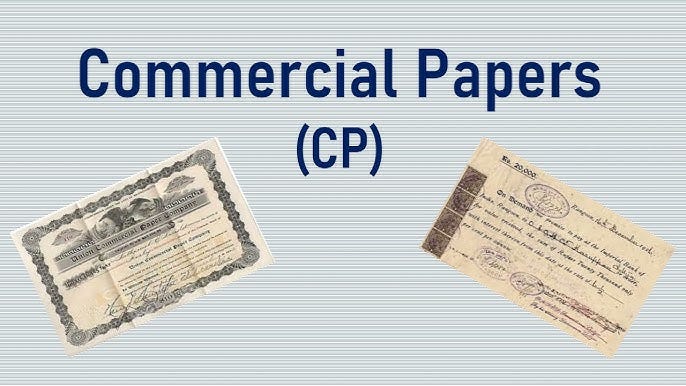Explainer: What Are Commercial Papers?
Explainer: What Are Commercial Papers?

I have written about wrote an explainer on Treasury Bills. The response to that post on social media surprised me. I didn’t expect that so many people wouldn’t know about that investment vehicle. That got me thinking: I should write about other investment options when I get the chance.
As luck would have it, one of the investment platforms I use sent me an opportunity involving commercial papers just a few minutes ago. Here’s what they shared:
Key Investment Details:
- Asset Name: Dangote Cement Plc Commercial Paper
- Series: 21
- Tenor: 268 days
- Yield (Annualised): 24.501%
- Gross Expected Yield: 17.99%
- Minimum Subscription: ₦100,000
- Start Date: June 10th, 2025
- Maturity Date: March 11, 2026
- *** Allocation: ₦50 million
- Issuer Rating: AA+ (GCR), A1 (DataPro)
- Issuer: Dangote Cement Plc
- Listed On: Nigerian Exchange (NGX: DANGCEM)
- Withholding Tax: 10%
- Processing Fee: 2%
If those numbers and terms look confusing, don’t worry, that’s exactly why I’m writing this post.
What Exactly Is a Commercial Paper?
Let’s say a company needs money quickly for short-term operations. Maybe to buy raw materials or cover salaries while waiting on a big client to pay up later in the year. Instead of going to the bank for a loan or selling off more shares (which would dilute ownership), the company turns to the public, people like you, and says:
“Lend us your money for 9 months, and we’ll pay you back with interest.”
That’s what a commercial paper (CP) is. A short-term, unsecured debt instrument issued by companies to raise money quickly, often for working capital.
Why Do Companies Use Commercial Papers?
1. They’re Cheaper Than Bank Loans.
Interest rates on CPs are usually lower than bank loan rates, at least for large, creditworthy companies. Right now, due to Central Bank of Nigeria (CBN) guidelines, banks generally can’t lend below 27.5%. But CPs can be offered at more competitive rates for investors while still saving the issuer money.
2. They’re Faster.
Bank loans come with plenty of paperwork, risk assessments, and long approval times. CPs are quicker. Companies can raise funds in days instead of weeks or months.
3. They’re More Flexible.
Unlike banks, which often prefer multi-year loans with rigid terms, companies can design CPs with flexible tenors, even as short as 30 days. The regulatory maximum in Nigeria is 270 days, I think. So, CPs allow companies to raise only what they need, for exactly how long they need it.
4. They Avoid Ownership Dilution.
By borrowing through CPs instead of issuing more shares, companies can raise funds without giving up control.
But Not Just Any Company Can Do This.
This point is crucial: not every business is allowed to issue commercial papers. In Nigeria (and globally), only large, financially sound companies with investment-grade ratings (A, AA, AAA, etc.) from SEC-approved rating agencies can issue them.
For example, Dangote Cement has an AA+ rating from GCR, which indicates strong creditworthiness.
Even though CPs don’t require full SEC registration (as long as they mature within 270 days), issuers must still register with the SEC and follow its guidelines. That’s because commercial papers are unsecured, meaning if the company defaults, investors cannot claim collateral. So, regulators make sure only trustworthy, high-performing firms are allowed to issue them.
But Should You Invest?
Absolutely, if you understand the risks and choose reputable companies. You should always research any company offering a CP. Because CPs are unsecured, if a company defaults, your legal options are limited. Your best protection is the company’s financial reputation.
Breaking Down the Dangote Cement Offer
Let’s revisit the key details of the CP I received and break it down with an example:
You invest ₦100,000.
Tenor = 268 days (~9 months)
Gross Yield = 17.99%
→ ₦17,990 expected earnings
Withholding Tax (10%) = ₦1,799
→ Net earnings = ₦16,191
Processing Fee (2%) = ₦2,000
→ Final Profit = ₦16,191 − ₦2,000 = ₦14,191
So, on maturity (March 11, 2026), you get:
Initial Capital = ₦100,000
Net Profit = ₦14,191
Total Payout = ₦114,191
→ That’s a net return of 14.19% in 9 months.
But Wait — Why Is the Advertised Yield 24.501%?
The 24.501% is the annualised yield, what you’d earn if the investment lasted a full 365 days at the same rate. It’s a benchmark used to help investors compare different products fairly.
So although you’re getting 14.19% in 268 days, that rate scales up to 24.501% over a full year, which lets you easily compare it with other 1-year or 6-month investments.
Commercial papers are a great way to earn more than your typical bank savings, especially when issued by reliable companies. But like any investment, you need to understand the risks, and the math. On a lighter note, it is in this maths matter that those who think school na scam will expose themselves.
CPs are not insured, and you’re trusting that the company will pay you back on time. So, always do your due diligence.
If you’re interested in CPs in Nigeria, speak to a licensed stockbroker, investment adviser, or CP dealer platform. With good due diligence and the right partners, CPs can be a powerful tool in your wealth-building strategy.

